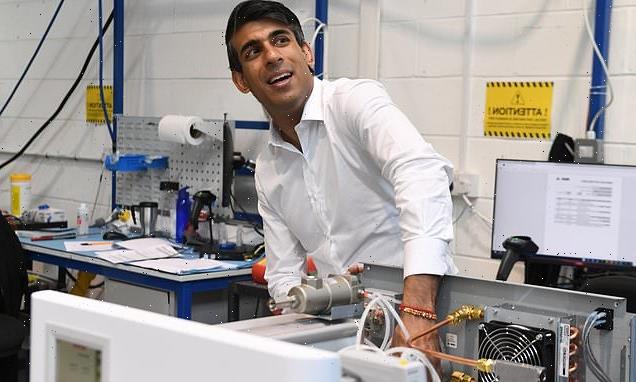UK bounces back to work: Total number of people on payroll rises to a record 29.5million as firms hire 108,000 more staff, figures reveal
- Another 180,000 staff were added onto firms books in December and January
- The total number of workers on payrolls has risen to record 29.5 million
- Rishi Sunak has welcomed data as sign more families are in work and will be better able to afford rising living costs
- Recovery since Covid lockdowns ended means there are now 436,000 more staff in work than before pandemic
Britain’s booming jobs market brushed off Omicron worries as companies kept hiring into the New Year, official figures revealed yesterday.
Firms added another 108,000 staff on to their books in December and January – taking the total number of workers on payrolls to a record 29.5million.
Chancellor Rishi Sunak has welcomed the data as a sign that more families are in work and will be better able to afford rising costs.
The steady recovery since Covid lockdowns ended means there are now 436,000 more staff in work than before the pandemic struck two years ago.
And joblessness finally fell back below pre-pandemic levels for the first time in December to 3.9 per cent, data from the Office for National Statistics showed.
This was below the 4 per cent seen in February 2020 – and a far cry from the doom-laden forecasts of 9 per cent as the coronavirus crisis erupted.
Chancellor Rishi Sunak has welcomed the data as a sign that more families are in work and will be better able to afford rising costs
Mr Sunak said: ‘Our £400billion economic plan has protected our jobs market through the pandemic and it is now healthier than most could have hoped for.
‘Payrolled employee numbers are at a record high and redundancies are at an all-time low thanks to our Plan for Jobs.’
The data also revealed record vacancy levels, with advertised job openings rising to 1.29million for the three months to January, representing a 513,700 increase on pre-pandemic levels.
The display of Britain’s rapid rebound came amid another day of gloom for the eurozone.
The combined economy of the countries which use the euro grew by just 5.2 per cent last year, according to the European Commission’s Eurostat agency.
This is well below the 7.5 per cent growth which the UK achieved.
And in the final quarter of the year, the eurozone expanded by just 0.3 per cent compared to the UK’s 1 per cent – but Britain was building back from a lower base.
The UK’s dwindling unemployment also left its European neighbours trailing in its wake, as joblessness in the area was at 7 per cent in December.
Sir Iain Duncan Smith, the former Tory party leader, hailed Britain’s employment boom as a ‘jobs miracle’. But he warned that with inflation set to rise, possibly faster than wages, the Government needed to beware of worsening the cost of living crisis for households.
Martin Beck, chief economic adviser to forecasting group EY ITEM Club, said the data shows the ‘jobs market largely shrugged off the drag on activity from Omicron in December’.
Sir Iain Duncan Smith, the former Tory party leader, hailed Britain’s employment boom as a ‘jobs miracle’
However, businesses were still hungry for workers. The largest rise in vacancies was in accommodation and food services, as workers shunned the sector – which has been battered by Covid restrictions – to find jobs they perceived as more stable.
Suren Thiru, head of economics at the British Chambers of Commerce, said: ‘Record vacancies underscore the critical hiring crisis facing firms.’
He noted that many have left the jobs market altogether, choosing to retire or go back into education, which means ‘chronic staff shortages are likely to weigh on the UK economy for a sustained period’.
The fewer staff that are available, the more businesses will have to pay them to lure them in. Economists are worried that this in turn will drive up the prices of goods and push the cost of living higher.
Source: Read Full Article


